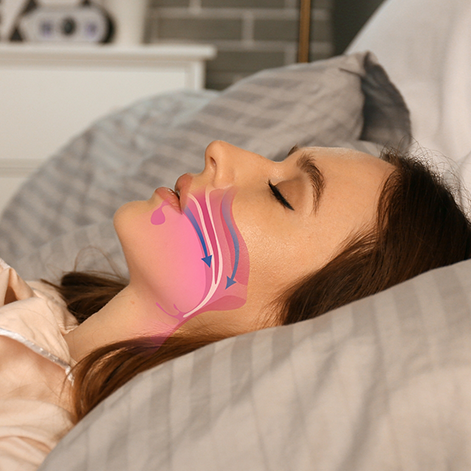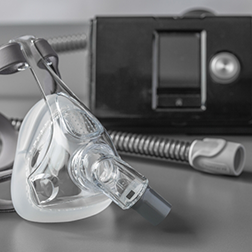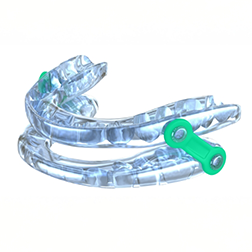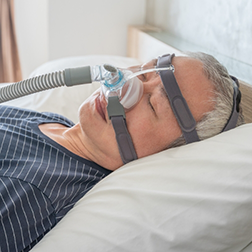Obstructive Sleep Apnea Concord
Don’t Let Airway Blockages Keep You Up at Night

Even though there are a few different types of sleep apnea, the most common type by far is obstructive sleep apnea, or OSA. Having this disorder means that your airway becomes physically blocked while you’re asleep, which results in pauses in your breathing throughout the night. Dr. Homsi and our whole team are here to offer a solution—this condition is not something that you or a loved one should have to needlessly endure! If you believe you have an airway disorder like obstructive sleep apnea in Concord, don’t hesitate to contact our office to schedule a consultation.
Why Choose New Hampshire Airway Wellness Center for Obstructive Sleep Apnea Treatment?
- Sleep Dentist with Countless Hours of Continuing Education
- Highly Personalized Oral Appliances for Every Patient
- Insurance-Friendly and Financing Options Available
What Causes Obstructive Sleep Apnea?

When the muscles in the back of your throat become too relaxed, they can end up obstructing your airway, thereby disrupting the flow of oxygen and leading to obstructive sleep apnea episodes. Even the tongue falling backwards toward the throat can cause the issue! You should also note that obstructive sleep apnea tends to be more common in individuals who are overweight, as well as those with naturally narrow airways.
Possible Complications of OSA

One of the biggest problems that OSA causes is daytime fatigue and exhaustion, and if this continues for too long, it could even put a strain on your cardiovascular system. This can lead to high blood pressure, as well as an increased risk of heart disease or stroke. Some other consequences include headaches, memory loss, mood swings and irritability, an increased risk of motor vehicle accidents, and more. The bottom line is, your sleep contributes to your overall wellness in countless ways, and sleep apnea throws a wrench in everything!
Types of Treatment for Obstructive Sleep Apnea

There’s more than just one way to address your obstructive sleep apnea symptoms, and our team is here to review your options with you so that you can make the choice that’s right for your overall health.
Lifestyle Changes

Making just one or two simple changes to your lifestyle can actually have a large impact on your obstructive sleep apnea. For example, if your sleep disorder is linked to obesity, losing weight is one way of helping. You can also reconsider your sleeping position—believe it or not, you’re likely to have an easier time breathing while asleep if you’re on your side, rather than flat on your back. Of course, it’s also worthwhile to try to limit and reduce the number of loud disruptions that occur around your bedtime, in addition to keeping the area clean and free of allergens.
CPAP

CPAP machines are designed to help you maintain an open airway while you’re asleep using a nasal mask, hose, and pressurized air. CPAP machines are a very effective means of addressing sleep apnea, but it’s not uncommon for patients to have trouble tolerating them. This is why oral appliance therapy is more often used as a first line of treatment.
Oral Appliance Treatment

A custom-made oral appliance is a very effective treatment option for sleeping disorders like sleep apnea and snoring. It’s also capable of addressing certain challenges that are associated with sleep apnea, such as teeth grinding. Similar to a sports mouthguard, the oral appliance is worn in the mouth and works to reposition the jaw so that the central airway is kept open. At our office, we offer a wide assortment of different appliances, all of which can be custom-fitted to the wearer to ensure maximum effectiveness—and remarkable comfort.
Learn More About Oral Appliance Treatment
Combined Therapy

Both oral appliances and CPAP machines can be used separately to treat OSA, but it’s also possible—and quite beneficial at times—to use both of them at once in certain cases. The oral appliances can help to keep the airway open, while the CPAP machine can be turned to a lower setting, which makes it more comfortable to use while also still ensuring adequate airflow.
Surgery

In severe cases of sleep apnea where alternative forms of treatment don’t seem to be effective, surgery may be the only viable way to address it. Rest assured, though, we can help you figure out what steps need to be taken to deal with your obstructive sleep apnea based on your circumstances.
